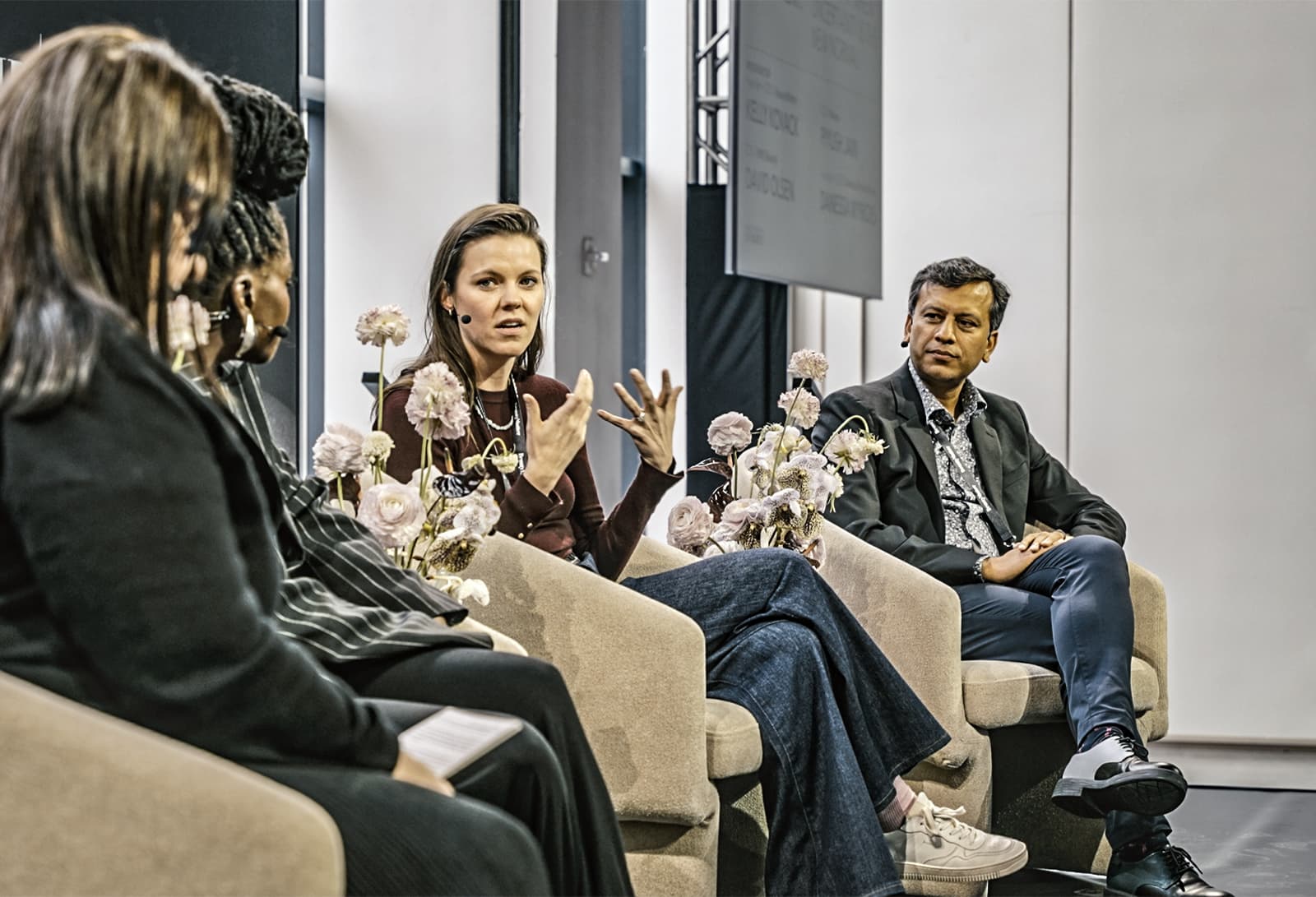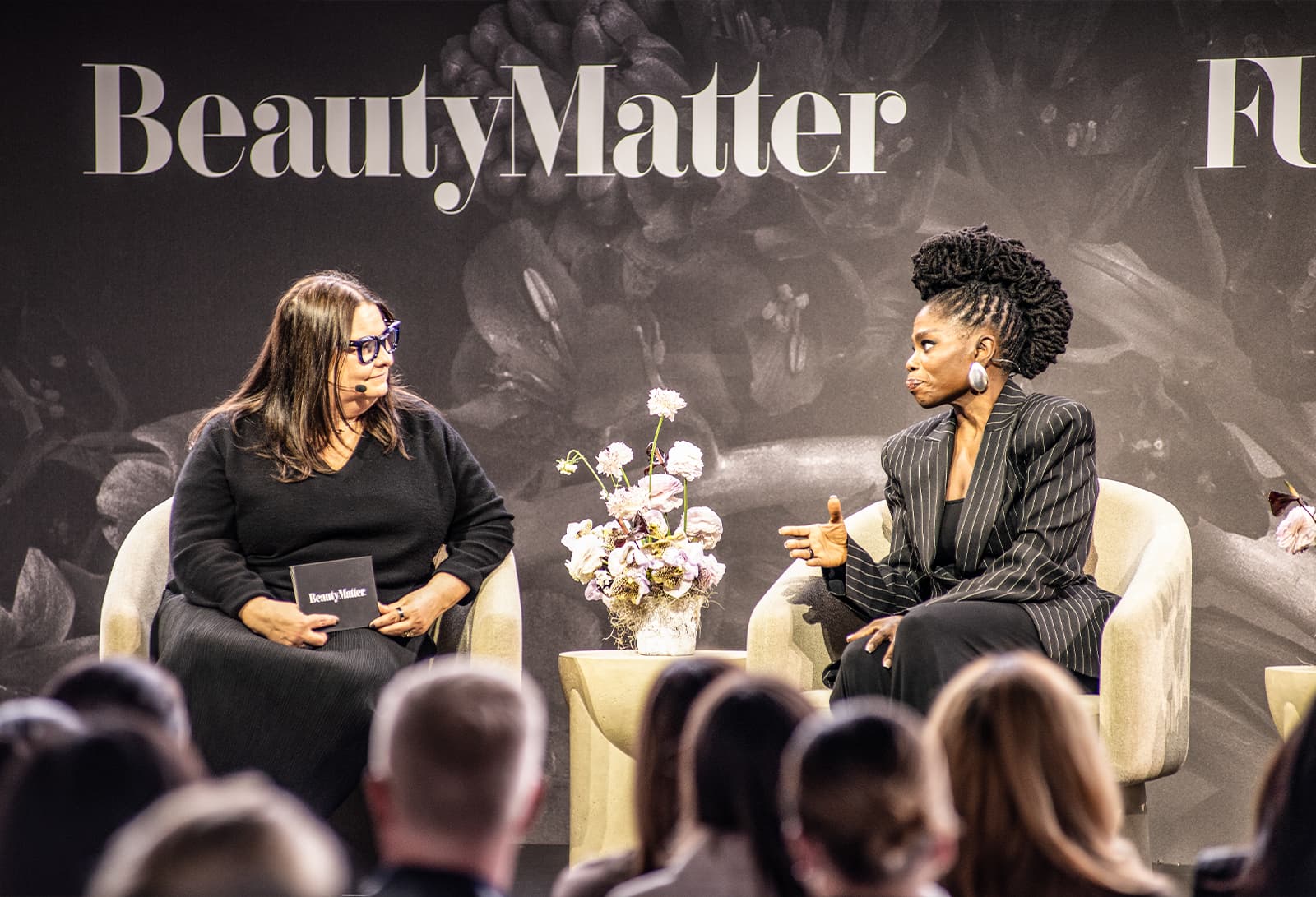Strong leaders are more crucial than ever as the beauty business faces headwinds of political, social, and economic challenges, as well as an increase in competition and technological transformations.
Margaret Mitchell, Chief Commercial Officer of SpaceNK; Piyush Jain, CEO of Maesa; and Danessa Myricks, founder and CEO of Danessa Myricks Beauty sat down with BeautyMatter founder and CEO Kelly Kovack to discuss what it takes to navigate their companies through this disorienting state of permacrisis.
The speakers began by describing their leadership styles and the company culture they built to ensure success. Myricks attributed hers to a quote from Zig Ziglar: “You can have everything in life you want, if you will just help other people get what they want.” She highlighted building a cross-functional ecosystem—”one team, one dream”—striving for a unique purpose. “People can work anywhere, but what gets you out of bed in the morning? Is it that you make beauty products or that you connect hearts and minds to beauty?”
Mitchell emphasized three things: hitting deliverables, setting the tenants of culture through brand partnerships and co-creation, and hiring “incredible teams and letting them loose.” “For us, the customer is the KPI. We measure everything through customer performance,” she said. "We measure success by store, by brand, by week. That level of granularity keeps us accountable."
Jain set the scene with two philosophies on the current state of business. “The pace of change today is the fastest it’s ever been—and the slowest it will ever be,” he said. “That's the reality we are faced with. The second is: this whole idea that I can control everything is just not possible. You have to focus your energy on controlling the controllables.” Jain builds his teams with two tenets in mind: united values but diversity in thinking. “As a leader you need to inspire, challenge, and believe in your team,” he said.
Given Myricks’ role as both founder and CEO, Kovack asked how she was addressing the current business environment. “Having a product go viral can change your whole business, but the focus is always on operational excellence,” she replied. That includes building a strong foundation and keeping her team focused during an “incredibly distracting time.” The focus is on the basics like supply chain, inventory, POS [points of sale], and customer interaction.
Mitchell’s current focus is on sustaining SpaceNK’s 30% year-over-year growth, which has been consistent over the last four years. “We know the recipe that works, but a big part of our recipe is creativity and thinking differently. The recipe has to move and spin faster. It’s next year that keeps me up at night.”
Jain’s leadership is focused on taking Maesa from a beauty incubator to a next gen beauty company, creating a “portfolio of the future” that caters to multiple consumer demands, with a supply chain to match. “Creativity is global, but our supply chain has to be local. That’s how we’ve stayed agile,” he said. That local aspect is also a huge benefit given the current rulings on international tariffs. Lastly, he is leaning into technology to help Maesa be a content factory—especially as it relates to the company’s fragrance brand, Fine’ry, where all creative output is AI-generated. “You cannot rely on a few creatives somewhere sitting and creating content when the world is demanding content,” he said.
Machine-learning models are also a tool for SpaceNK, which uses in-house and proprietary machine-learning models to drive LTV (lifetime value) with customers by forecasting new products and allocating them accurately to maximize performance across the channel. “Technology that is invisible and drives efficiency, and then customer experiences that are unique and incredible but really human—that’s what we prioritize,” Mitchell said.
The discussion shifted to discounting, which Kovack said was a method of customer acquisition but has now become a slippery slope where customers are trained to never pay full price. As a Sephora-stocked brand, Myricks needs to be conscious of maintaining retail price, but the retailer has also been a key part of the brand tenfolding its business. Myricks said that her brand is a success 20 years in the making with 70% of customers being new. “It’s important that we solidify ourselves as a brand before we start racing to the bottom with discounting,” she said. She acknowledged the missed customer acquisition opportunity on the other side of the equation, but added: “Prioritizing what value people see in our brand is most important for a business at our stage.”
For SpaceNK investing in “money-can’t-buy experiences” like a fragrance pop-up are ways to balance discounting. “It would be naive to say we’re just not going to do it [discount], because the customer does value that … But we like to create an experience where the customer can come in and do something that is different from just shopping around for a price,” Mitchell said.
The panel ended by discussing building resilience within a team when uncertainty is the new normal. “For me, it’s doubling down on who we are and what we stand for. They know our core values and how we operate as an organization,” Myricks said. “If you’ve created a community of people who want to see you win, who love how you make people feel, who love what you stand for—that’s who stays with you.”
Jain highlighted the power of the lipstick effect and remained optimistic, aided by the masstige price points of Maesa’s portfolio. “Some consumers navigate upwards during difficult moments. Beauty over a matter of time is resilient. Consumer confidence is currently low, but I don't expect this to last,” he said.
For Mitchell, it’s about pivoting the KPIs, shifting from ATV (average transaction value) to nurturing the customer and focusing on frequency and conversion instead. “If they want to spend half of what they spent last year, that's okay. They are still going to have a great experience. Wrapping our arms around that customer, no matter what their journey, is really important in times like this,” she said.
An audience member asked about managing the generational differences in a workforce, especially how to engage and sustain younger team members. “It's really important that we allow people to be themselves,” Myricks responded. She described her offices as “the United Nations” with members’ ages ranging from 20 to 65 years old. “We're allowing our team to show up how they want to. To tell us what their strengths and deepest desires are, and then we're navigating their roles based on that. Strong leadership can shift the mold and replan their organizational chart based on the existing talent.”
By emphasizing brand values, AI-driven co-creation, and in-person experiences that money can’t buy, Myricks, Mitchell, and Jain laid out a resilient strategy for the uncertain times ahead.


The discussion shifted to discounting, which Kovack said was a method of customer acquisition but has now become a slippery slope where customers are trained to never pay full price. As a Sephora-stocked brand, Myricks needs to be conscious of maintaining retail price, but the retailer has also been a key part of the brand tenfolding its business. Myricks said that her brand is a success 20 years in the making with 70% of customers being new. “It’s important that we solidify ourselves as a brand before we start racing to the bottom with discounting,” she said. She acknowledged the missed customer acquisition opportunity on the other side of the equation, but added: “Prioritizing what value people see in our brand is most important for a business at our stage.”
For SpaceNK investing in “money-can’t-buy experiences” like a fragrance pop-up are ways to balance discounting. “It would be naive to say we’re just not going to do it [discount], because the customer does value that … But we like to create an experience where the customer can come in and do something that is different from just shopping around for a price,” Mitchell said.
The panel ended by discussing building resilience within a team when uncertainty is the new normal. “For me, it’s doubling down on who we are and what we stand for. They know our core values and how we operate as an organization,” Myricks said. “If you’ve created a community of people who want to see you win, who love how you make people feel, who love what you stand for—that’s who stays with you.”
Jain highlighted the power of the lipstick effect and remained optimistic, aided by the masstige price points of Maesa’s portfolio. “Some consumers navigate upwards during difficult moments. Beauty over a matter of time is resilient. Consumer confidence is currently low, but I don't expect this to last,” he said.
For Mitchell, it’s about pivoting the KPIs, shifting from ATV (average transaction value) to nurturing the customer and focusing on frequency and conversion instead. “If they want to spend half of what they spent last year, that's okay. They are still going to have a great experience. Wrapping our arms around that customer, no matter what their journey, is really important in times like this,” she said.
An audience member asked about managing the generational differences in a workforce, especially how to engage and sustain younger team members. “It's really important that we allow people to be themselves,” Myricks responded. She described her offices as “the United Nations” with members’ ages ranging from 20 to 65 years old. “We're allowing our team to show up how they want to. To tell us what their strengths and deepest desires are, and then we're navigating their roles based on that. Strong leadership can shift the mold and replan their organizational chart based on the existing talent.”
By emphasizing brand values, AI-driven co-creation, and in-person experiences that money can’t buy, Myricks, Mitchell, and Jain laid out a resilient strategy for the uncertain times ahead.